Bridging divides





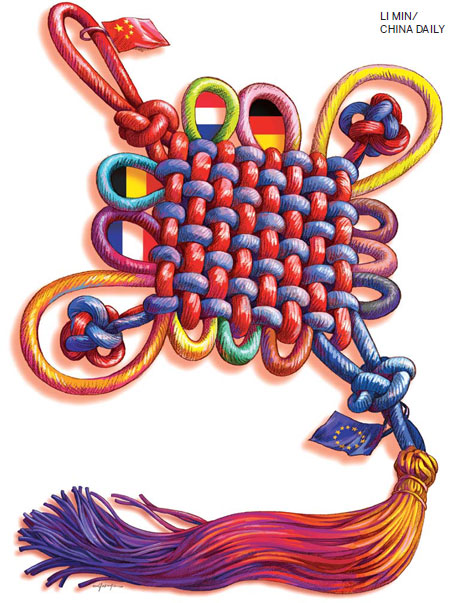
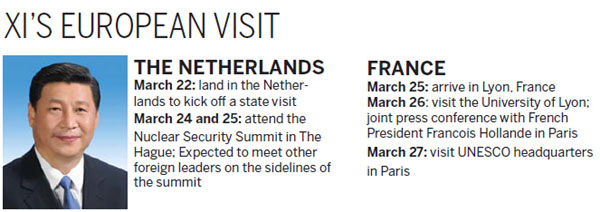

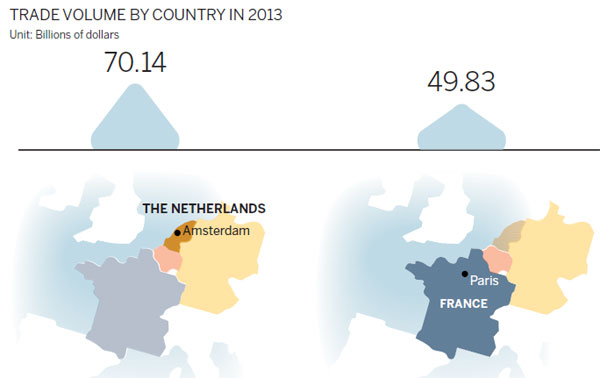
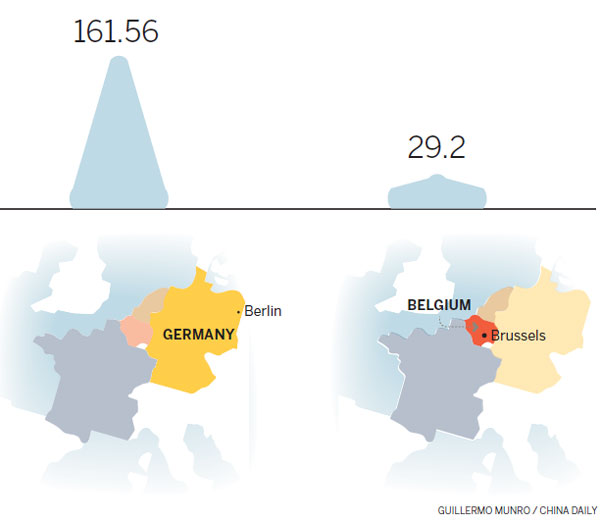
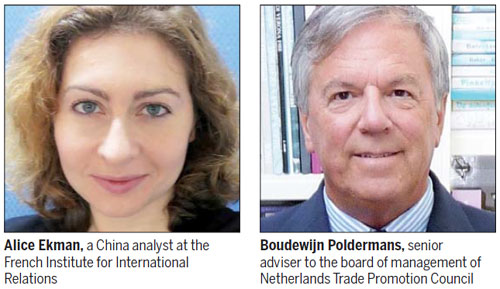
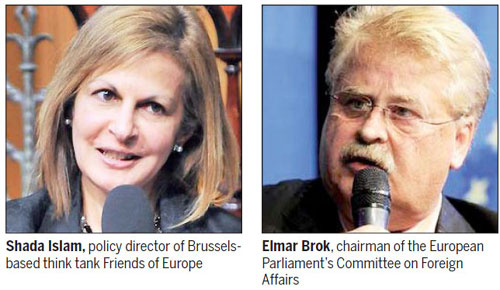
China, Europe look to maintain growth momentum in bilateral engagements
Building ties and bridging divides will be the main focus for President Xi Jinping during his 11-day tour to Western Europe that includes a visit to the European Union headquarters in Brussels.
The trip will take Xi and his wife Peng Liyuan to four European countries and will include a visit to the UNESCO headquarters in Paris. However, the packed agenda, which includes several public appearances, will be dominated by political and economic discussions, experts say.
"Xi has reiterated that he will take the lead in helping Europeans and Chinese understand each other better through public diplomacy, and this is something that he has included in his packed agenda," says a source close to the scheduling arrangements.
After arriving on March 22, Xi will pay a state visit to the Netherlands and attend the Nuclear Security Summit on March 24 and 25 in The Hague. US President Barack Obama is also expected to attend the meeting. Xi is expected to visit the EU headquarters in Brussels on March 31.
Xi and Obama are also expected to hold informal discussions during the summit in The Hague. They will discuss several geopolitical issues and the current situation in Ukraine. During his three-day stay in Belgium, Xi will visit the Chinese pandas at a zoo about 60 kilometers from Brussels.
From The Hague, Xi will travel to France where he will mark the 50th anniversary of the establishment of diplomatic relations and then to Germany to further develop relations with the European economic powerhouse.
Fresh perspective
According to observers, Xi is expected to give new impetus and fresh perspectives to continuing investment negotiations between China and the EU.
Both sides are expected to start discussions on a formal agreement during the second round of talks scheduled for next month. Similar talks between China and US began only after eight or nine rounds of preparatory discussions, sources say.
Highly placed sources say that the two sides are also likely to start feasibility studies for a free trade agreement soon, though Brussels is yet to grant Beijing market economy status.
Elmar Brok, chairman of the European Parliament's Committee on Foreign Affairs, says the very fact that Xi is visiting Brussels with a large delegation demonstrates the high regard China has for its ties with the EU.
"China and the EU have become increasingly close trading partners. Trade with the EU has played an important role in China's economic growth, and the meetings in Brussels are a good occasion to discuss ways to deepen the relationship."
Xi's visit is important politically as it follows on the heels of recent developments in Ukraine. Brok hopes that the visit will mark China's increased involvement in global affairs and its transition as a "stabilizing player" on the international scene.
Brok, a center-right politician from Germany who is respected at all points of the political spectrum, hopes that China's market-oriented reforms will make it even more efficient.
"One thing is clear. China's economic success was built on past market reforms, and this path must continue."
Brok also has high expectations about the current leadership in China. "I am pleased that Xi is meeting with the EU leaders in Brussels," he says. "It demonstrates his interest and commitment, and that of the entire Chinese leadership, to deepen ties between the EU and China.
"Even with economic growth slowing down, China remains an economic powerhouse. The question is rather how China uses its economic clout to become a political source of stability in a world increasingly marked by friction."
EU-China relations, he believes, have become "deeper and deeper" over the years, "reflecting mutual respect and closer trade links".
"It is in our joint interest to create the right conditions to enhance relations. This includes creating stable legal conditions for European investment in China, just as China enjoys stable legal conditions in Europe."
However, one cause for concern is Sino-Japanese relations, and on these, he says, "China has inherent interest in geopolitical stability, worldwide and in Asia in particular, not least since China's economic boom depends on open borders and global trade. This interest carries an obligation to assume responsibility for regional stability in Asia, and presumes a policy based on respect, mutual trust and actions aimed at dissipating tensions."
Nearly everybody would agree that no single country can tackle today's challenges alone, he says, adding that the economies and security of Europe and China are interconnected.
To handle global challenges, he believes the EU, the US and China must all play a prominent role and contribute to a "stronger, fairer and more effective" multilateral system.
He also supports those who call for a "new type" of relationship between the US and China. "I think it is clear by the sheer size and nature of their economies and the importance of their political actions that the United States and China do have an important relationship."
But, as he is keen to emphasize, words are cheap. "We must see the reality beyond the rhetoric."
Strategic engagements
Shada Islam, policy director of the think tank Friends of Europe in Brussels, says Xi's visit shows that Beijing has raised its level of strategic interaction with the EU and member states.
"This is likely to reassure the EU that it is still viewed as a pivotal player in Europe-China relations and that China is not - as feared by some - ignoring and sidelining Brussels in favor of building stronger relations with EU member states."
Islam says the visit is a good diplomatic move by Beijing and a sign of a significant improvement in Sino-European ties, especially personal relations and the establishment of trust between European and Chinese leaders.
It is also significant that Xi will meet Herman Van Rompuy and Jose Manuel Barroso, the top EU leaders, and the European Parliament President Martin Schulz, who is being widely tipped as the next president of the European Commission, she says.
Islam says the Europe-China partnership is multifaceted and covers a number of important areas.
"Europeans are following China's new reform agenda very carefully and are hoping that the momentum on economic liberalization, reform of the SOE (state-owned enterprises) sector and the drive for greater financial openness will continue.
"They are, of course, concerned about the rising levels of pollution in China and could want more details about China's 'war on pollution' as well as efforts to fight corruption," she says, adding that Europeans realize more than ever that in a post-eurozone crisis world, global growth and jobs depend on China's continuing growth and will be seeking reassurances about access to China's markets.
Ukraine and Russia are likely to be key points on the agenda, with Europeans seeking to understand China's position on the events in Ukraine, Islam says. "Discussions may also center on the Democratic People's Republic of Korea, Syria and Iran."
Investment drive
Boudewijn Poldermans, senior adviser to the board of management of the Netherlands Trade Promotion Council, says this is the first time that a Chinese president has visited the Netherlands. This is also Xi's first visit to Europe since becoming president and the first incoming state visit for King Willem Alexander.
Poldermans says the EU is most important trading partner, and the Netherlands is the second largest trading and investment partner among all EU countries.
"We are honored and pleased that this ranking has been recognized by the Chinese leadership," Poldermans says.
Expectations are high that the China-EU Investment Agreement will be signed soon after Xi's visit to Europe, he says. He believes that such an agreement would facilitate and boost investment and trade between the two economies.
"I hope that this will also lead to China being recognized as a market economy by Brussels," Poldermans says.
Deepening of reform and opening-up and the implementation of an innovation-driven development strategy with an average GDP growth rate of about 7.5 percent as reiterated by Premier Li Keqiang during the recent annual session of the National People's Congress will promote reform, address severe pollution and improve people's livelihoods in China, Poldermans says.
"This will definitely give rise to many new business opportunities," he says.
Poldermans says the Netherlands is a politically stable country with a strong, internationally focused economy and business and is strategically located in Europe. It has excellent infrastructure with seaports and one of the best airports in the world, he says. Moreover the Netherlands government strongly supports foreign investment and offers several tax benefits and other incentives.
In addition, it has an excellent telecommunications network and several successful industries such as agriculture, financial services, oil and gas, life sciences, biotechnology, high-tech food processing, creative industries, transport and logistics, chemicals and information technology.
Poldermans also cites recent studies that show Europe is one of the fastest growing investment destinations for China.
"Chinese investors are shifting their focus from the US to Europe because of the larger market and distribution channels and because it is easier to acquire advanced technologies in Europe."
Chinese enterprises view the Netherlands as a perfect base to tap the European market, he says. There are 366 large Chinese enterprises that have subsidiaries in the Netherlands or have acquired local companies, and most of them are successful.
In addition, there are more than 9,000 first-generation Chinese SMEs in the Netherlands. Some of the prominent acquisitions by Chinese companies there include the takeover of TIP Trailer Services by HNA (Hainan Airlines Group) and Chinese food giant COFCO's purchase of Dutch grain trader Nidera.
"I expect many more will follow this year, especially in the agriculture/agro-industry and food sectors and in high technology, clean technology, bio technology and consumer products," Poldermans says.
French connection
Xi's visit to France coincides with the 50th anniversary of diplomatic ties between the two countries, China and the EU will celebrate the 40th anniversary of their ties in 2015.
Jean-Pierre Raffarin, former French prime minister and vice-president of the French Senate, says Xi has a strong image in the world.
"We expect him to deliver a strong but also responsible message when he visits Europe and France."
Raffarin says for the first time in history, the interests of China are closely bound up with the interests of the rest of the world. China and France need to reinforce their global partnership and France needs to discuss with Chinese authorities a common global strategy.
"I think a multi-polar strategy is one of the subjects that will come up for discussion. We have to tell the world that we want to cooperate more and in all fields. China and France also need to make sure that they share the same vision of the world. They also have to talk about economic matters and bilateral investment as the two countries need more cooperation and common projects in new areas."
Pierre Picquart, a China observer and professor of geopolitics at the University of Paris VIII, says Xi's visit to France will be a great opportunity to create a strong platform for future relations.
"We must develop our bilateral relations and engage new concrete economic programs in all areas. Both China and France will benefit from the positive relationship."
The economic future of France implies that it is moving in this new direction with the goal of promoting its partnerships with China, Asia and other emerging countries, Picquart says. Asia, especially China, is booming, which is an opportunity for France to strengthen its ties with China, he says.
"We need to be more open, more confident and more pragmatic, and base our relations on major long-term projects. France should continue to welcome Chinese enterprises, Chinese investment and Chinese students to establish large partnerships.
Alice Ekman, a China analyst at the French Institute for International Relations, says China is in transition. Major economic reforms and institutional reshuffling have been announced under the leadership led by Xi and this represents an opportunity for bilateral relations, she says.
With China's development strategy, including urbanization, healthcare and energy, French companies can look for opportunities, she says.
"But this also represents a challenge as the bilateral relation needs to adjust to the new contexts," she says.
"Understanding the new institutional and policy framework currently under construction in China is a difficult task. In practical terms, an increase in the number of bilateral meetings, both formal and informal, is the key to deepening mutual understanding."
Contact the writers through fujing@chinadaily.com.cn.
Li Xiaofei contributed to this story.
(China Daily Africa Weekly 03/21/2014 page16)
Today's Top News
- Opportunities, policies lure overseas talent back
- Asia-Pacific community highlighted at meeting
- Takaichi using old tricks with new words
- White paper outlines security path for HK
- Nation's digital trade surplus doubles in 2025
- Xi extends Spring Festival greetings


























